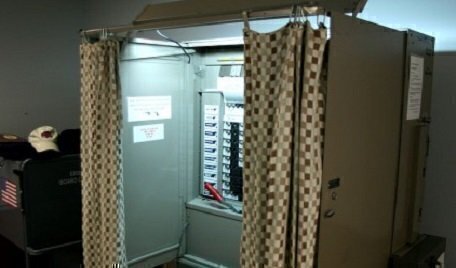Last week, a divided Supreme Court said a Minnesota law barring political clothing within polling places is unconstitutional, but it left a door open that could result in specific apparel bans at the polls.
 The 7-2 majority decision from Chief Justice John Roberts in Minnesota Voters Alliance v. Mansky faulted the law for its vagueness, which resulted in First Amendment violations on free speech grounds.
The 7-2 majority decision from Chief Justice John Roberts in Minnesota Voters Alliance v. Mansky faulted the law for its vagueness, which resulted in First Amendment violations on free speech grounds.
Roberts said the law’s wording made it difficult for it to be applied in a reasonable manner. “The line the State draws must be reasonable. The State therefore must be able to articulate some sensible basis for distinguishing what may come in from what must stay out,” Roberts explained.
“The discretion election judges exercise in enforcing the ban must be guided by objective, workable standards. Without them, an election judge’s own politics may shape his views on what counts as ‘political.’ And if voters experience or witness episodes of unfair or inconsistent enforcement of the ban, the State’s interest in maintaining a polling place free of distraction and disruption would be undermined by the very measure intended to further it,” Roberts said.
“Thus, if a State wishes to set its polling places apart as areas free of partisan discord, it must employ a more discernible approach than the one offered by Minnesota here,” he concluded.
Citing Court precedents, Roberts said “in light of the special purpose of the polling place itself, Minnesota may choose to prohibit certain apparel there because of the message it conveys, so that voters may focus on the important decisions immediately at hand.” But the law has to meet a broad definition of what is reasonable.
“Here, the unmoored use of the term ‘political’ in the Minnesota law, combined with haphazard interpretations the State has provided in official guidance and representations to this Court, cause Minnesota’s restriction to fail even this forgiving test,” Roberts said.
Justice Sonia Sotomayor wrote the lone dissent, where she was joined by Justice Stephen Breyer. “I disagree … with the Court’s decision to declare Minnesota’s political apparel ban unconstitutional on its face because, in its view, the ban is not ‘capable of reasoned application,’” Sotomayor said.
“I would certify this case to the Minnesota Supreme Court for a definitive interpretation of the political apparel ban,” she said.
The dispute began when Andrew Cilek of Hennepin County was temporarily stopped from voting because he was wearing a T-shirt with a “Don’t Tread on Me” and a Tea Party slogan, and a button endorsing Voter ID policies.
Polling officials said Cilek violated Minnesota Statute Section 211B.11, which prevents voters from wearing political badges, political buttons, or other “political insignia” at polling places, because the messages communicated are “designed to influence and impact voting” or promote a “group with recognizable political views.”
Cilek has argued that his rights were violated because the law is “facially overbroad under the First Amendment” because it “broadly bans all political apparel at the polling place.” In particular, the law gives local poll judges wide latitude to determine policies that ban political speech at the polls – in the form of political clothing.
On its way to the Supreme Court, a district court dismissed Minnesota Voters Alliance v. Mansky, in part citing a 1992 Supreme Court decision, Burson v. Freeman. In that 5-3 decision, Justice Harry Blackmun found that that the state of Tennessee had the right to establish a “restricted zone around polling places” as “necessary to serve the interest in protecting the right to vote freely and effectively.”
A divided Eighth Circuit appeals court upheld the lower court decision, relying on the Burson decision and three decisions from other federal circuit courts. But in their appeal to the Supreme Court, the attorneys for the petitioners noted that two other federal appeals courts, the Fourth Circuit and the Seventh Circuit, found that a broad ban on political speech at the polls conflicts with the First Amendment.
Scott Bomboy is the editor in chief of the National Constitution Center.







